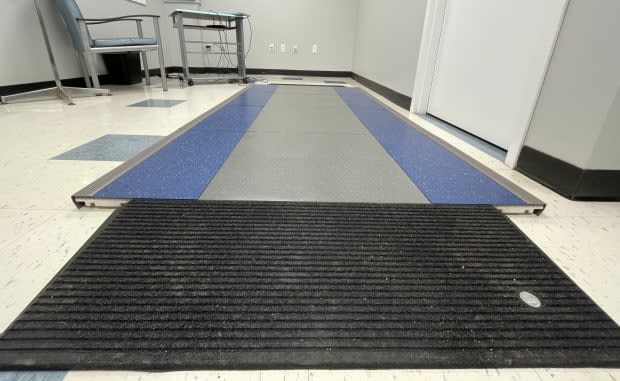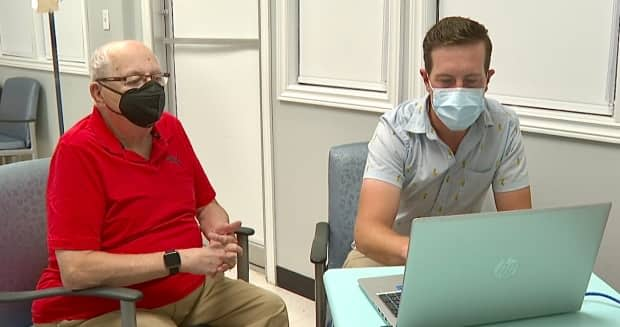How a new program is preventing foot problems in diabetic Islanders

A new made-in-P.E.I. technology is helping detect and prevent foot problems in patients with diabetes.
It's called Stepscan and looks like a long floor mat with sensors hidden underneath. As a patient walks along the top, the sensors analyze and reflect their steps on a computer nearby.
"So we have some higher pressure areas in the red here, underneath the balls of your feet," said Hayden Atkinson, a physiotherapist who runs the tests.
"This would be where more of the pressure is being distributed in your feet and it's kind of putting you at a higher risk for an ulcer."
The screen is lit up with a replay of the patient's steps. Red indicates where the most pressure was placed and light blue, the least.

The physiotherapist then uses that information to give feedback and exercises that might help the individual better distribute the weight on their feet.
'Hopefully this will help'
Stratford's Gary Gaudet was diagnosed with diabetes around 30 years ago. The disease can cause nerve damage and poor circulation leading to foot ulcers or in some cases amputation.
"I learnt that I was walking heavy on the balls of my feet," said Gaudet.
"If I had blisters ... I have to be very careful because once they bust, they bleed, whatever, and it's hard to get them healed."

Gaudet has been registered in the Diabetes Active Steps for Health (DASH) program for about three weeks now. In addition to foot health, the program is also trying to prevent clients from falling.
"About six months ago, I got dizzy spells," he said.
"I'm always afraid of falling because when I stoop over or if I look down, I have a tendency to wobble ... So hopefully this will help me."
Looking for more clients
Between visits, Gaudet is working on exercises at home to help with foot health and balance. At the eight-week mark, he will be reassessed to see if there has been any improvement.
"If you're a diabetic and you're scared of falling or whatever, get into this program and see if you learn something from it," he said.

Atkinson agrees: "It's a small clinic that I hope can grow a little bit and get more people involved," he said.
"They've been very appreciative and everybody's been very happy to come in."
'Great potential'
The program is currently open to anyone over the age of 50 living with diabetes or those with the condition who have a higher risk of falling.
"They don't need a doctor to refer," said Carolyn MacPhail, manager of chronic disease prevention and management with Health P.E.I.
"However, a doctor or nurse practitioner or other health-care provider can refer on their behalf if that's easier for the patient."

MacPhail said although DASH has only been available for around five weeks now, feedback has been positive and spots are still available for Islanders who meet the criteria.
"It's very exciting and so far we are seeing improved efficiencies and also improved objective findings," she said.
"So we do see great potential ... We definitely see this as being part of future health-care delivery."


